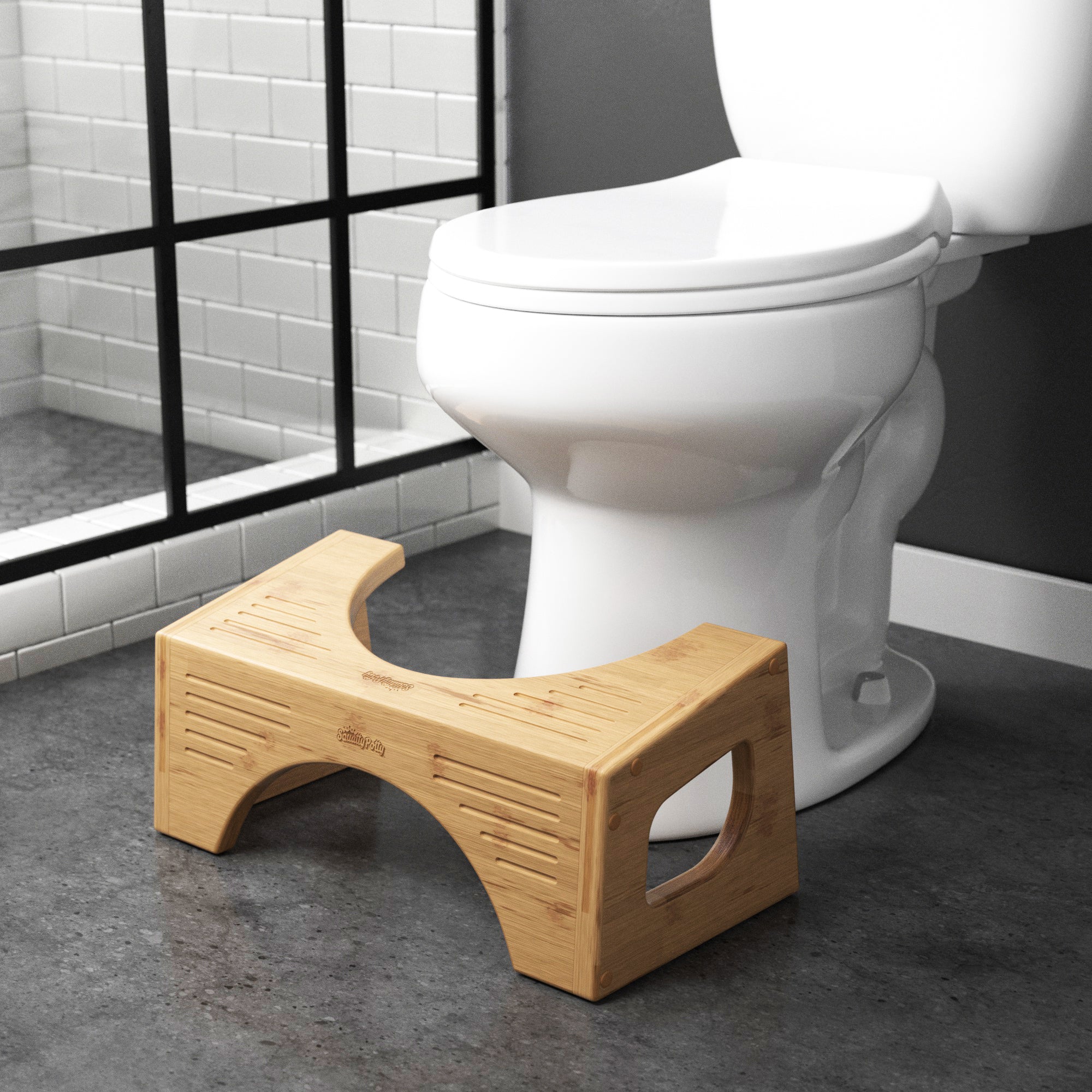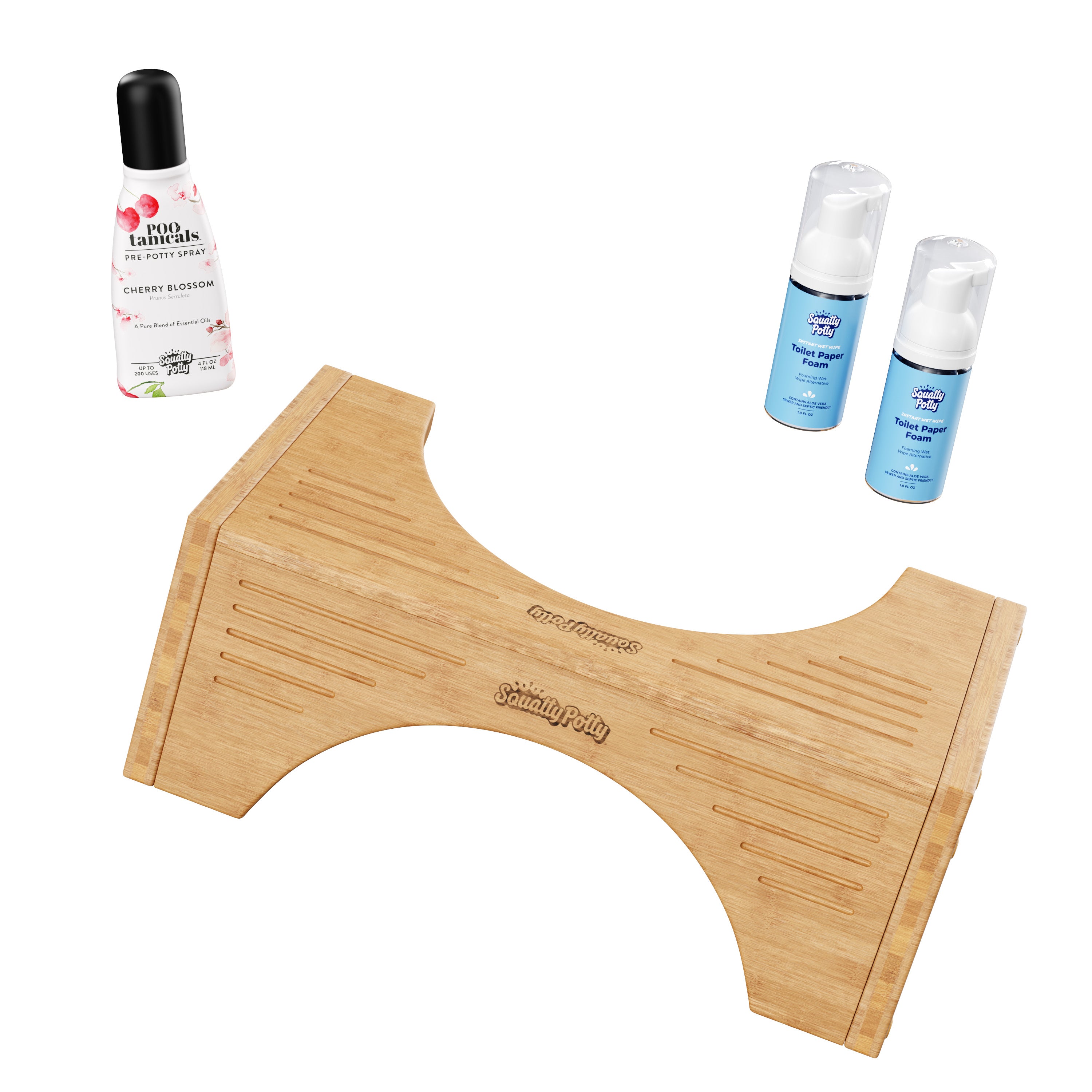
Everything you never knew you wanted to know about diarrhea
We all know the feeling. You’re relaxing or working when the symptoms hit out of nowhere: stomach cramps, bloating, and the sudden urge to use the bathroom. Uh oh. It’s diarrhea. Batten down the hatches, prepare your Squatty Potty, and hold onto your butt—you’re about to have a liquid bowel movement.
Diarrhea is a common digestive disorder that affects everyone at some time or another. The experience, much like the symptoms, can be painful and unpleasant. Try as you might to avoid the squirts, chances are some errant hot dog, or unwashed hand will upset your stomach at some point this year and leave you with unwanted waterworks. That's why it's important to understand the causes, symptoms, and methods for prevention and treatment.
Shop toilet stools
What is diarrhea?
Diarrhea is a condition in which a person has multiple loose or liquid bowel movements in a day. It’s basically when your #2 looks and feels more like a #1, with no solid pieces and a watery consistency. It is a widespread condition and affects people of all ages.
Diarrhea symptoms are loose, watery stools, abdominal cramps, stomach pain, bloating, gas, nausea, and vomiting.
What causes diarrhea?
Diarrhea is a common digestive disorder, and various factors can cause it.
Acute diarrhea is a short-term condition that usually lasts a few days. The average adult experiences this type of diarrhea four times per year. Here are a few of the ways the rumbly in your tummy can start:
Viral, bacterial, and parasitic infections are the most common causes of acute diarrhea. People can contract these infections through contaminated food or water or close contact with an infected person. Examples of these infections include norovirus, salmonella, E. coli, campylobacter, and Shigella.
Infections cause diarrhea by disrupting the normal functioning of the gut. When harmful microorganisms enter the body, they wreak havoc, creating inflammation, inciting imbalances, and damaging the stomach lining or intestines.
Consuming contaminated food or drink can cause food poisoning, which can lead to diarrhea. Toxins or pathogens in the contaminated food can irritate the lining of the stomach or intestines, causing inflammation and increased contractions of the muscles in the gut. These extra contractions result in loose, watery stools, abdominal cramps, bloating, gas, nausea, and vomiting
Symptoms of food poisoning usually appear within a few hours to a few days after consuming the contaminated food or drink. In most cases, the symptoms will clear up within a few days, but in some cases, they can last longer and require medical attention.
Certain medications can cause diarrhea as a side effect. Antibiotics can kill off harmful and beneficial bacteria in your gut, disrupting the sensitive balance in your digestive system.
Overuse of laxative medication can also cause the runs. They increase the water content in stool by stimulating the muscles in the gut to contract more frequently, leading to loose, watery stools.
Chronic diarrhea, on the other hand, is long-term diarrhea that lasts more than a few weeks. It can be caused by various factors such as gastrointestinal disorders, such as inflammatory bowel disease (IBD) and Irritable Bowel Syndrome (IBS), food allergies or intolerances, and certain medications. People with chronic diarrhea may also experience weight loss, fatigue, and malnutrition. If you have chronic diarrhea, you should contact your doctor to get to the root of the issue.
What can I do to prevent diarrhea?
Diarrhea can be a crappy experience (pun intended). It’s painful, embarrassing, and disruptive to your daily routine. With that in mind, here are a few steps you can take to prevent muddy collywobbles in the future.
Keeping your hands and body clean can reduce the risk of exposure to harmful microorganisms that cause diarrhea. One of the most effective ways to prevent diarrhea is to wash your hands regularly, especially before eating and after using the bathroom. Cleaning your hands helps remove harmful microorganisms that can cause diarrhea when ingested.
A healthy diet that includes enough fiber and fluids can help prevent diarrhea. Adding an extra glass of water for hydration or a daily probiotic can help your stomach maintain a healthy balance of bacteria. Foods like bananas, ginger, and boiled potatoes are easily digested and can help your body prevent dehydration and bind loose stools.
Foods high in fat, sugar, and caffeine can worsen diarrhea symptoms. Street food may not be prepared in the most hygienic conditions, so it's best to avoid that bratwurst ala carte if you're trying to avoid the big D.
- Practice safe food handling
Consuming contaminated food or liquids is the easiest way to punch your ticket to diarrhea town. To prevent this, avoid untested tap water and raw or undercooked food in countries where sanitation is poor.
Make sure that food is cooked thoroughly, especially meat and eggs. Whenever possible, use separate cutting boards for raw meat and produce and wash them thoroughly before using them again.
What can I do to treat diarrhea?
Even when you’ve done everything you can to avoid it, diarrhea is certain to rear its nasty head at least a few times a year. Here’s what you should do to treat diarrhea once you start experiencing symptoms.
Diarrhea can cause dehydration, so drinking plenty of fluids is essential. Avoid drinks that contain caffeine or alcohol, as they can worsen diarrhea symptoms.
Restrict your diet to easily digested foods like bananas, rice, applesauce, and toast. These foods will calm your stomach and firm up loose stools. Avoid any goods that you're sensitive to, or that could irritate the stomach lining.
Diarrhea can be draining (literally), so getting plenty of rest is vital to help your body recover.
While a toilet stool can’t help your body fight infection or alleviate symptoms, it can make your pooping experience more pleasant. By assuming a squatting position on a Squatty Potty, the angle between the rectum and the anus is optimized, making it easier for you to let every last drop into the bowl.
As a last resort, you can try over-the-counter medications like Imodium and Pepto-Bismol. These medicines can help to reduce diarrhea symptoms by slowing down the contractions of the muscles in your gut.
If your diarrhea persists for more than a few days or you experience severe symptoms, it's important to seek medical attention. A doctor can help determine your diarrhea's cause and recommend appropriate treatment options.
The Final Turd
While diarrhea is common, it can be dangerous in some instances, especially in young children, older adults, and people with weakened immune systems. It's important to stay hydrated, eat a balanced diet, and seek medical attention if necessary. Taking the time to understand the causes and symptoms of diarrhea is the first step in preventing and treating it.
Shop Stools










